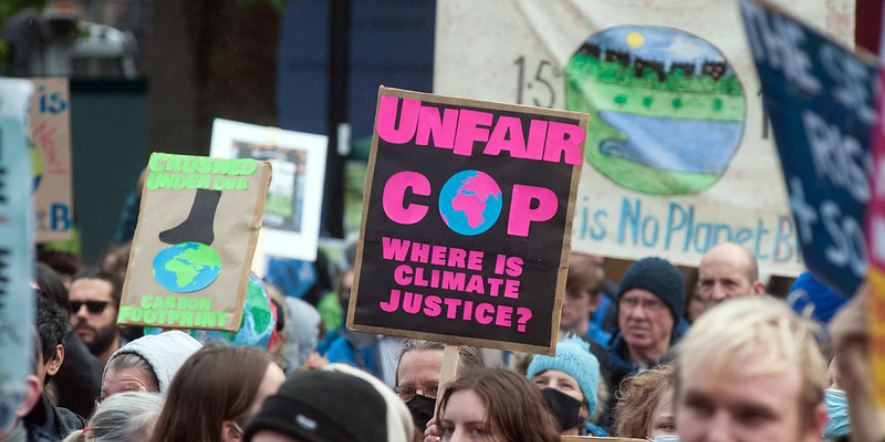
Submitted by Livia Harriman on Wed, 17/11/2021 - 11:40
The greatly anticipated COP26 conference was a chance for all parties to make enhanced commitments towards mitigating climate change.
Our POLIS researchers participated and reported live from Glasgow throughout the conference.
Dr Cristina Peñasco on COP26's Climate Justice Day Protests
Raising voices
Young people, families with little children, teachers with groups of students, the elderly, representatives of indigenous communities…
Climate marches are no longer a scream from the youth, traditionally viewed as less-risk averse, more innovative, impulsive, eager or even rebellious.
The Climate March that we have seen this morning 6th of November in Glasgow is an example of that. The day has started with the worse weather since the beginning of COP26 last Sunday.
However, that has not prevented thousands and thousands of people to unite at noon on the premises of the Kelvingrove Park.
The Global Day for Climate Justice has started with this protest that has congregated, according to estimations, more than 50,000 people from all over the world and from very diverse demographics. This is not only the desire of climate activists; it is the demand of a society that understands there is no future if action is not taken now.
The risks and costs of inaction are way bigger than the risks and costs of acting now, both environmentally and economically (Sanderson and O’Neill, 2020).
In a day in which the premises of the official COP26 venue are quieter, the noise and demands are outside, on the streets, where citizens seem to embrace and understand the scientific evidence far better than their governors in charge of the negotiations.
The people are speaking: “Time is running out”, “There is no planet B”, “System change not climate change”.
These are some of the messages we saw this morning along the 3 miles that separate Kelvingrove Park from Glasgow Green when the climate march had its finish line.
As a participant, I have felt this “protest” has been a celebration: a celebration of life, of nature, of diversity, of plurality.
It has been exciting and thrilling being part of a massive group of people raising their voices for just and fair solutions to the climate crisis.
Dr Cristina Peñasco is a University Lecturer in Public Policy at POLIS. At Cambridge she is also a Bye-Fellow at Queens' College, a Centre Fellow at Centre for the Environment, Energy and Natural Resource Governance (C-EENRG) hosted at the Department of Land Economy, and an associate researcher of the Bennett Institute for Public Policy.
Dr Tobias Muller on the COP26 protests
Need the many demands, groups and narratives present at #COP26’s weekend protests explained?
Tobias Müller (@TobiasMueller_), a Cambridge Politics (@Dept_of_POLIS) lecturer, has been in Glasgow this weekend and provides his explanation of the protests’ ins and outs. pic.twitter.com/aRbw1OgWZe
— Cambridge Zero (@CambridgeZero) November 7, 2021
Dr Tobias Muller is Affiliated Lecturer at POLIS. Tobias works at the intersection of political theory, comparative politics, religious studies and political sociology. His research interests include political and social theory, 20th-century political thought, postcolonial and feminist theory, secularism and religion, gender and masculinity, and the politics of climate change.
CAMBRIDGE ZERO
A bold response to the world’s greatest challenge
The University of Cambridge is building on its existing research and launching an ambitious new climate change initiative. We are calling on the world’s brightest and best to join us in creating a zero-carbon future.
Read the rest of the COP26 coverage by Cambridge Zero here>>


